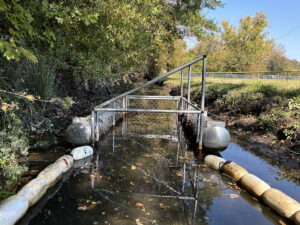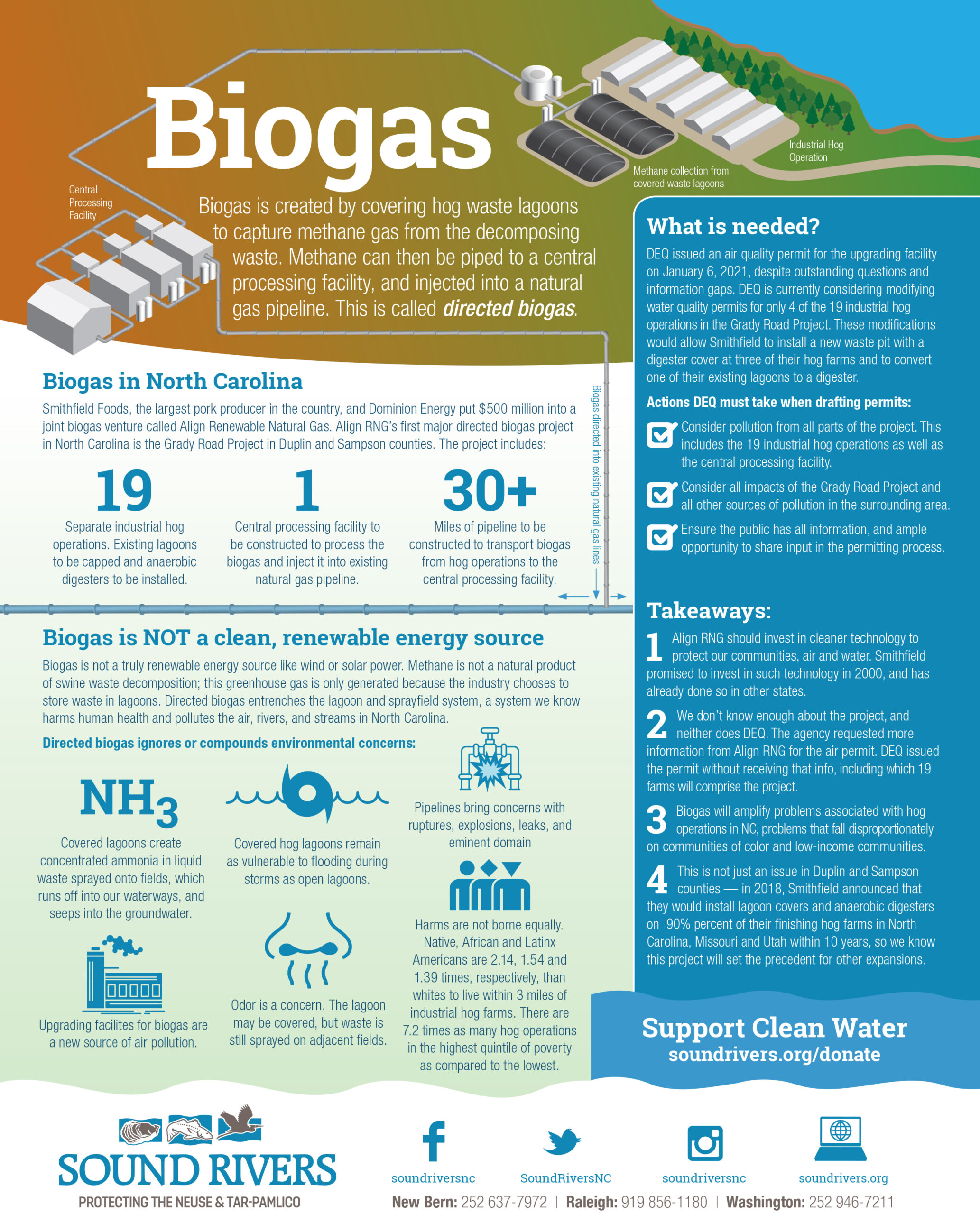News
Riverkeepers, residents speak out against biogas project
ACTION ALERT, Environmental, Sound Rivers
Posted on January 28th, 2021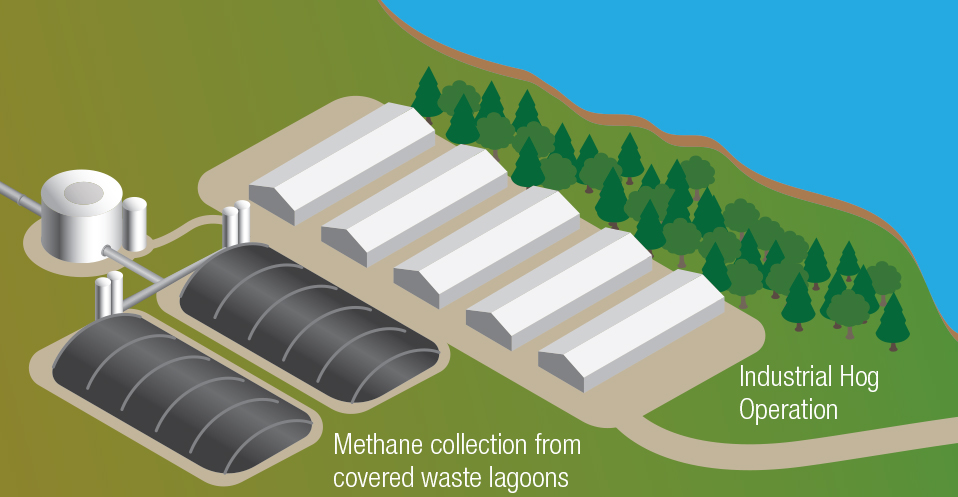
Advocates and residents aired their concerns about a biogas project underway in Sampson and Duplin counties during a virtual public meeting held by the North Carolina Department of Environmental Quality on Jan. 26.
You can take action by signing the petition asking Attorney General Josh Stein to enforce the terms of the Smithfield Agreement here.
“Many from the environmental community, including Riverkeepers, spoke out against it — there were also a number of people who live in Duplin and Sampson counties who are impacted by industrial hog operations,” said Pamlico-Tar Riverkeeper Jill Howell. “It was great to see so many people there, raising so many different issues with this biogas project and directed biogas projects, in general.”
DEQ scheduled the meeting because of the amount of public interest in a biogas project that is the first of its size in North Carolina. The Grady Road Project by Align Renewable Natural Gas, a venture created by Smithfield Foods and Dominion Energy, will consist of 19 hog operations and 30-plus miles of pipeline to pipe biogas from those operations to a central processing facility. Industrial hog operations will capture methane by covering open hog waste lagoons. Once captured, the biogas will be piped to and processed at a central facility before it will be injected into a natural gas pipeline.
Operators of four of these industrial hog facilities have petitioned DEQ to modify existing water permits, but one of the main objections is the proposed modifications are progressing piecemeal, as opposed to the total project’s total community and environmental impacts being weighed.
“DEQ shouldn’t be evaluating these permits individually, and they shouldn’t be evaluating the project until all 19 hog operations and the route of the pipeline are known,” Howell said.
During the meeting, Howell pointed out that since 2018, the Division of Water Resources identified issues related to improper lagoon management at all four facilities: two because sludge levels were too high. Another facility has been issued multiple Plans of Action to correct excessive freeboard levels — the buffer between liquid waste and the top of a lagoon — and discharged hog waste into public waters due to an equipment failure. The fourth facility has both sludge and freeboard issues with POAs for each, the most recent from January 2021.
“Now DEQ is prepared to modify these facilities’ permits, despite failure to comply with their current permits and knowing full well what can happen because of that. Covering lagoons and installing anerobic digesters is not going to solve these problems,” Howell said during the public comment period.
While DEQ will weigh public comments made at the meeting during its decision-making process, environmental advocates are calling for North Carolina Attorney Josh Stein to step in to enforce the Smithfield Agreement — a 20-year-old agreement between the state and Smithfield Foods — in which the company promised to install environmental superior technology to manage hog waste when it was economically feasible.
“The Attorney General is responsible for enforcing the Smithfield Agreement, and we are calling on him to require Smithfield to implement environmentally superior waste management technology at their company-owned and contract hog operations in North Carolina to address the harms to our waters, air and health of our communities. This includes a call for intervention in the permit-modification process for the four facilities and requiring Smithfield to comply with its obligations under the Agreement to implement cleaner technology before moving forward with the project,” Howell said.
Take action by signing the petition asking Attorney General Josh Stein to enforce the terms of the Smithfield Agreement here.
DEQ will continue to accept public comments by email, mail and voicemail until 5 p.m. Friday. Comments can be submitted in the following ways:
- Email publiccommentsDWR@ncdenr.gov with the subject line “Swine Biogas”;
- Mail to U.S. Postal Service to Ramesh Ravella, Department of Environmental Quality, 1636 Mail Service Center, Raleigh, North Carolina 27699-1636;
- By voicemail at 919-707-9010.
Watch North Carolina Environmental Justice Network’s take on biogas here.
Related News
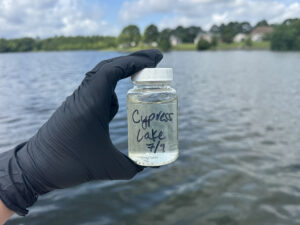
Specialist investigates lake connection to mysterious skin rash
July 10th 2025

Riverkeeper: Central NC flooding part of a much larger issue
July 10th 2025

N.C. Governor vetoes bad rulemaking bill
July 10th 2025

Riverkeeper, program director ‘Growing More than Rain Gardens’
July 10th 2025

Volunteer coordinator goes ‘fishing’
July 10th 2025
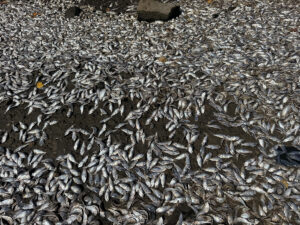
Neuse fish kill expected to extend beyond holiday weekend
July 3rd 2025
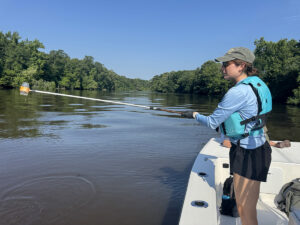
Swim Guide fails prompt Maple Cypress investigation
July 3rd 2025

Riverkeeper, town partners root out source of Smithfield sediment pollution
July 3rd 2025
